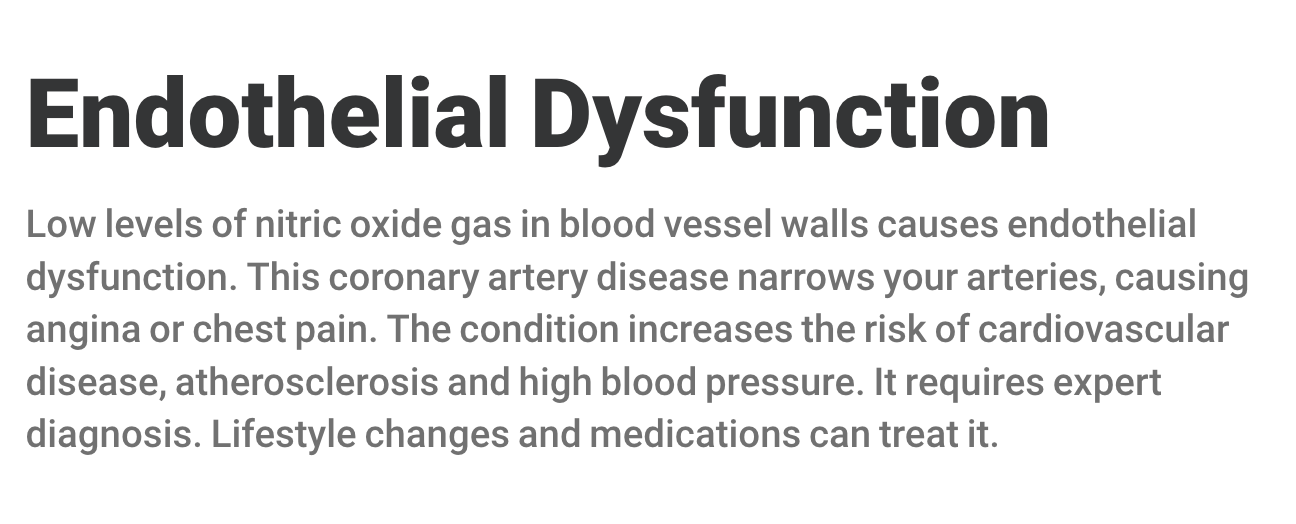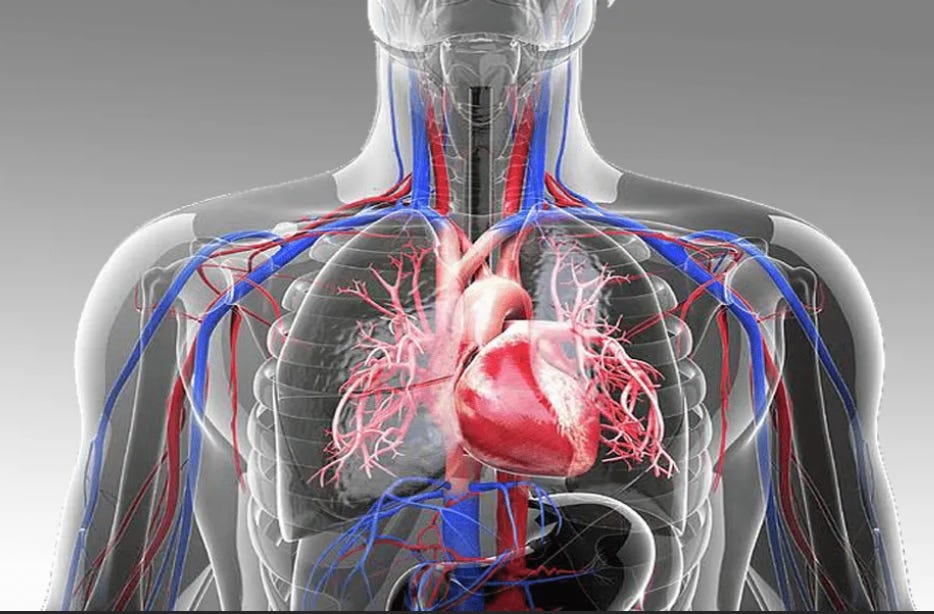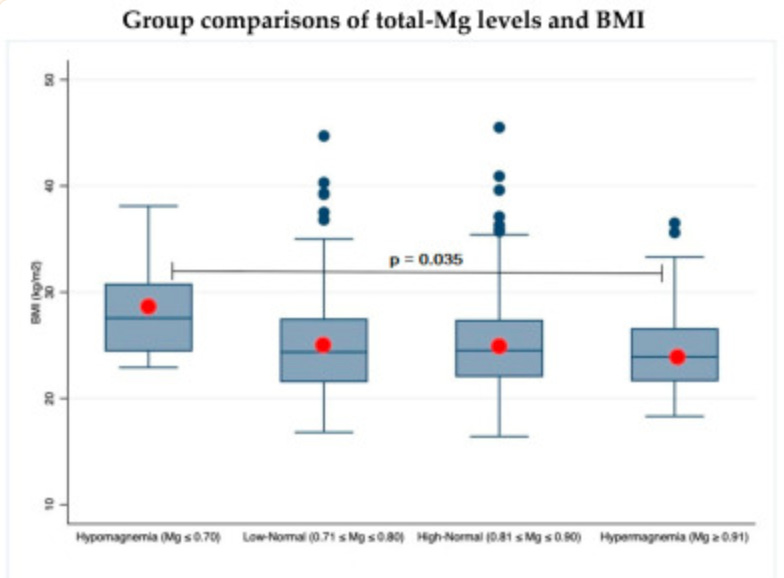There have been a some peer reviewed papers recently published which provide clear evidence that certain dietary supplements can help in repairing and supporting cardiovascular and vascular health. Based on these data, it is reasonable to hypothesize that supplements shown to support heart and vascular health in this manner will provide benefit to those with damage done to the heart and arteries/veins by COVID-19 and COVID-19 vaccines and most likely will have benefit.
This topic comes out of a conversation that I had with Dr. Ryan Cole and Dr. Richard Urso around the kitchen table one night a few months ago in Tennessee, when we were providing testimony to the Tennessee legislature on natural immunity. We were discussing damage done to the heart and vessels by COVID-19 as well as the vaccines, and what types of interventions or treatments can be done to help alleviate this damage. Jill mentioned supplements and all involved shared some very pragmatic ideas on the subject, a discussion that lasted well into the night.
In this Substack, I am writing to the many people with COVID-19 and vaccine damage - as well as older people and all the people that support them who have asked me the following question again and again.
“What can we do to alleviate damage from the jab and long COVID?”
So, if this isn’t you and you aren’t interested - feel free to stop reading now.
For those that don’t want to get into the peer reviewed literature, below is a brief overview on three supplements that one should consider taking for heart and vascular health. This section is followed by a brief discussion on dosing. Finally, I present the evidence in the form of selected peer reviewed literature.
First I provide a brief lay summary for each topic area, and then below I provide links to the papers.
Vitamin K2-MK7
Vitamin K2-MK7 is pretty much a miracle supplement, according a new peer reviewed meta analysis. Clinical studies have unequivocally demonstrated the utility of vitamin K2-7 supplementation as having a role in ameliorating peripheral neuropathy, reducing bone fracture risk and improving cardiovascular health, as well has health-beneficial effects in osteoporosis, cardiovascular disease, inflammation, cancer, Alzheimer's disease, diabetes and peripheral neuropathy.
Lower vitamin K2-MK7 levels have also been linked to low testosterone levels. In a mouse model, increasing vitamin K2 caused a rapid increase in testosterone. When taking K2, be sure to get enough calcium - as K2 is a calcium regulator and helps distribute calcium correctly throughout the body.
Magnesium:
Oral Mg supplementation improves endothelial function - after supplementing for at least for 6 months and in unhealthy, overweight or older individuals.
Orally supplementing with magnesium causes a decrease in blood pressure.
There is a higher risk of magnesium deficiency in overweight conditions
Note: Taking vitamin D in high levels, or being deficient in vitamin K2, can lower magnesium stores in the body and contribute to a deficiency. So, magnesium is an important supplement if you are taking vitamin D.
Taurine:
Taurine improves vascular tone and blood pressure modulation based on experimental and human studies. It is well established that supplementation of taurine prevents development of hypertension in several animal models and oral taurine administration reduces blood pressure in hypertensive patients.
“When our tissues need additional blood supply, like during exercise, or when we’re stressed, our blood vessels need to dilate efficiently. If blood vessels are not as elastic as they should be, then our health can suffer. The production of nitric oxide is very important to blood vessel health. When an adequate amount of nitric oxide is produced in our blood vessels, the vessels are more elastic, normal blood pressure can be maintained, sexual arousal occurs normally, and cardiovascular health is promoted”
Heart: Essential for healthy heart muscle function
Heart Rhythm: Helps maintain healthy heart rhythm
Taurine supplementation is also beneficial in reducing glycemic indices, such as HbA1c, Fasting Blood Sugar, HOMA-IR in diabetic patients. Taurine has also been shown to improve cognition in the elderly.
Dosing: Of course, our government has no interest in conducting randomized, clinical with dose escalation studies for improving cardiovascular health. So, there is some trial and error in all of this. The USDA/FDA came up with minimum and maximum values for vitamins and supplements back in the 1940s, and has occasionally reassessed some of these recommendations (but not others). These recommendations were based mostly on animal studies and consensus committee decisions (often driven more by opinion than data). All of these products will clearly say that the FDA has not evaluated these supplements for the uses recommended by the seller. The amounts recommended by the FDA are minimum dosing for general health - nothing more.
These days the FDA steers clear on the issue of dosing vitamins for specific benefits. This policy is due to a long history of trying to over-regulate the industry and the push back which the FDA received from Congress over this issue. NIH seems to have little interest in funding large clinical trials on supplements and dose escalation studies.
NIH Heart, Blood and Lung institute is conducting some studies on assessing COVID-19 and myocarditis but their webpage indicates that they are not putting resources into assessing vaccine injury and how to support people with damage from COVID-19 and COVID-19 vaccine damage.
Therefore, the dosing that Jill and I take for these supplements is determined by assessing what is recommended - based on peer reviewed literature, recommendations, discussions with the other doctors, the labelling and common sense. These are the doses we are taking, and recommend that you consult with your physician or licensed health care provider to help guide your own personal dosing decisions.
Vitamin K2-MK7: 100 mcg per day
Magnesium Glycinate: 400 mg per day.
Taurine: 1000-1500 mg per day - split into 2 or 3 doses.
Footnote: I started taking taurine back in spring, 2021 - after I was vaccine injured and started on a much lower dose. I never reassessed that dosing strategy. Having done more research for this article (see below
), I am increasing my dose to 1500 mcg daily.
Figuring out the correct dosing is difficult. Again - There is little solid research on dosing and no dose escalation studies conducted in humans for specific benefit of these supplements. There are many studies that seem “designed to fail” on vitamins and supplements - that is, clinical studies that under dose. These then get wrapped up in meta-analysis papers, which drag down the P-values of the meta-analysis. For this reason, specific papers are often a better indicator of results.
There is a certain amount of reliance on bottle labelling, peer reviewed studies that skirt around the issue and trial and error. This answer regarding dosing really isn’t satisfactory, but it is what we have.
In the comments, I would love to hear your thoughts on dosing of these supplements and why or why not you find these dosing amounts correct. Feel free to also discuss other methods of increasing heart health.
Below are a few selected papers showing the research behind using these supplement for heart and vascular health.
Vitamin K2-7
Molecular Pathways and Roles for Vitamin K2-7 as a Health-Beneficial Nutraceutical: Challenges and Opportunities
Front Pharmacol 2022 Jun 14;13:896920. doi: 10.3389/fphar.2022.896920. eCollection 2022.
Abstract
Vitamin K2-7, also known as menaquinone-7 (MK-7) is a form of vitamin K that has health-beneficial effects in osteoporosis, cardiovascular disease, inflammation, cancer, Alzheimer's disease, diabetes and peripheral neuropathy. Compared to vitamin K1 (phylloquinone), K2-7 is absorbed more readily and is more bioavailable. Clinical studies have unequivocally demonstrated the utility of vitamin K2-7 supplementation in ameliorating peripheral neuropathy, reducing bone fracture risk and improving cardiovascular health….
Please read this review. This is one supplement that you want on your short list!
Vitamin K 2-a neglected player in cardiovascular health: a narrative review
Open Heart . 2021 Nov;8(2):e001715. doi: 10.1136/openhrt-2021-001715.
Abstract
Vitamin K2 serves an important role in cardiovascular health through regulation of calcium homeostasis. Its effects on the cardiovascular system are mediated through activation of the anti-calcific protein known as matrix Gla protein. In its inactive form, this protein is associated with various markers of cardiovascular disease including increased arterial stiffness, vascular and valvular calcification, insulin resistance and heart failure indices which ultimately increase cardiovascular mortality. Supplementation of vitamin K2 has been strongly associated with improved cardiovascular outcomes through its modification of systemic calcification and arterial stiffness. Although its direct effects on delaying the progression of vascular and valvular calcification is currently the subject of multiple randomised clinical trials, prior reports suggest potential improved survival among cardiac patients with vitamin K2 supplementation. Strengthened by its affordability and Food and Drug Adminstration (FDA)-proven safety, vitamin K2 supplementation is a viable and promising option to improve cardiovascular outcomes
Read that last sentence again:
Strengthened by its affordability and Food and Drug Adminstration (FDA)-proven safety, vitamin K2 supplementation is a viable and promising option to improve cardiovascular outcomes
Magnesium Glycinate:
Does Ionized Magnesium Offer a Different Perspective Exploring the Association between Magnesemia and Targeted Cardiovascular Risk Factors?
J Clin Med. 2022 Jul 11;11(14):4015. doi: 10.3390/jcm11144015
Abstract
Evidence of the association of magnesium (Mg) with arterial stiffness has so far been conflicting. The interplay between hypertension and elevated body mass index (BMI), with hypomagnesemia, instead, has been described in the literature in a more consistent way. Our study aims at revisiting the correlations between blood Mg levels and hemodynamic and body composition parameters in the general population, exploring the sensitivity profile of ionized Mg (Ion-Mg) compared to total Mg (Tot-Mg). We collected data from 755 subjects randomly chosen from a Swiss population previously described and stratified our sample into four equivalent classes according to ionized (whole blood) and total (serum) magnesium…
Our results confirm that Ion-Mg compared with Tot-Mg offers a different profile in detecting both correlations with hemodynamic and body composition parameters and dysmagnesemias. Lower levels of magnesium were associated with worse arterial aging parameters, larger 24 h blood pressure excursions, and higher BMI. Ion-Mg was superior in detecting the correlation with blood pressure only. Considering Ion-Mg as a more specific marker of the magnesium status, and the partially contradictory results of our explorative cross-sectional study, to avoid confounding factors and misinterpretations, ionized magnesium should be used as reference in future studies.
This study shows a correlation between higher magnesium levels and better arterial aging parameters, lower 24 h blood pressure excursions, and lower BMI
The literature survey found in this paper is also helpful:
The literature has so far suggested the presence of a correlation between serum magnesium levels in the upper part of the distribution and lower arterial stiffness parameters [44], an inverse relationship between magnesium intake and blood pressure [9], and a higher risk of magnesium deficiency in overweight conditions [15].
Nonetheless, evidence regarding the role of Mg in cardiovascular diseases, including hypertension [29,30,31,32,33] and arterial aging parameters [34,35,36,37], and its correlation with body composition, on the one hand remains inconclusive, and on the other, derives mostly from total serum magnesium analyses.
Effects of Oral Magnesium Supplementation on Vascular Function: A Systematic Review and Meta-analysis of Randomized Controlled Trials
High Blood Pressure & Cardiovascular Prevention volume 27, pages19–28 (2020)
Abstract
Introduction: The effects of magnesium (Mg) supplementation on vascular function have been evaluated in some randomized controlled trials (RCT) but their results are conflicting.
Aim: A systematic review and meta-analysis were conducted to summarize the effects of oral Mg supplementation on vascular function in RCT.
Conclusions: This meta-analysis suggest that oral Mg supplementation may improve endothelial function when conducted at least for 6 months and in unhealthy, overweight or older individuals.
Taurine:
Taurine is another supplement that people consider taking, who have high blood pressure and/or diabetes and for good reason. There is clinical evidence of its efficacy.
Effects of taurine on vascular tone
Amino Acids 2022 Aug 19. doi: 10.1007/s00726-022-03198-6. Online ahead of print.
Abstract
Taurine is widely distributed at high concentrations in mammalian tissues, and it plays an important role in a wide range of biological effects including modulation of cardiovascular functions. This review summarizes the role of taurine in vascular tone and blood pressure modulation based on experimental and human studies. It is well established that supplementation of taurine prevents development of hypertension in several animal models and p.o. taurine administration reduces blood pressure in hypertensive patients…
The effects of taurine supplementation on diabetes mellitus in humans: A systematic review and meta-analysis
Food Chem (Oxf). 2022 Mar 21;4:100106. doi: 10.1016/j.fochms.2022.100106.
Abstract
Objective: The ameliorative effect of taurine on diabetes has received extensive attention in recent years. Despite promising data from animal studies, the efficacy of taurine supplementation in human studies has been inconsistent. We thus did a meta-analysis of randomized controlled trials to assess the effect of taurine supplement on glycemic indices, serum lipids, blood pressure, body composition in patients with diabetes.
Methods: We systematically searched PubMed, Embase, Cochrane, Web of Science, FDA.gov, and ClinicalTrials.gov for randomized controlled trials (published from inception to January 15, 2022; no language restrictions) about the effect of taurine supplement on diabetes. Values of Standardized Mean Differences (SMD) were determined for continuous outcomes.
Results: Of 2206 identified studies, 5 randomized controlled trials were eligible and were included in our analysis (N = 209 participants). Compared with the control group, taurine could significantly reduce HbA1c (SMD -0.41[95% CI: -0.74, -0.09], p = 0.01), Fasting Blood Sugar (SMD - 1.28[95% CI: -2.42, -0.14], p = 0.03) and HOMA-IR (SMD - 0.64[95% CI: -1.22, -0.06], p = 0.03). In addition, taurine also reduced Insulin (SMD -0.48 [95% CI: -0.99, 0.03], p = 0.06) and TG (SMD -0.26 [95% CI: -0.55, 0.02], p = 0.07), but did not reach statistical significance.
Conclusions: Taurine supplementation is beneficial in reducing glycemic indices, such as HbA1c, Fasting Blood Sugar, HOMA-IR in diabetic patients, but has no significant effect on serum lipids, blood pressure and body composition in diabetic patients. Taurine emerges as a new option for the management of patients with diabetes. Further studies are needed to understand the potential effect of taurine in diabetic patients.
And there you have it! There are supplements that probably will help with both damage and improved heart and vascular health.
https://rwmalonemd.substack.com/p/well-being-cardiovascular-damage?utm_medium=email


